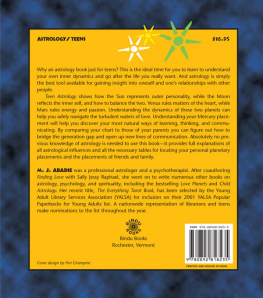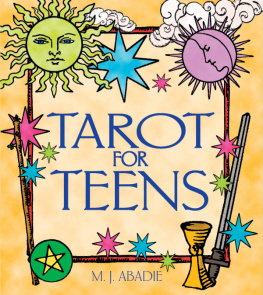
Acknowledgments
My thanks are extended to all those who have shared their dreams with me over the years, both clients and friends. From them I learned so much about the multileveled and fascinating world of others dreams, which served to enhance my own personal dreaming experiences.
I owe a particular debt of gratitude to my longtime dreamwork partner, Mark Hasselriis, whose untimely death in 1999 deprived me of the major pillar of my most intensive years of dreamwork.
Also deserving of acknowledgment are those writers who have written about dreams and shared their precious knowledge with the world. I have been educated and inspired by many of them.
Closer to home, my thanks go to my always wonderful editor, Laura Schlivek, for her unfailing support and attention to the many tedious details involved in the journey of a manuscript into final form as a book.
To those otherspublisher Ehud Sperling, acquisitions editor Jon Graham, managing editor Jeanie Levitan, designer Mary Anne Hurhula on the staff of Inner TraditionsI offer my profound appreciation for their enthusiasm, care, and encouragement.
My thanks go to my dear friend Walter Allen for a timely suggestion that I investigate the connection between dreams and weather, which proved fruitful and added another dimension to my understanding of the nature of dreams.
Considering the nature of this book, it also seems appropriate to thank the dreaming process itselfwhatever its true origins may bewithout which there would be no book!
Preface
Dreams:
Your Hidden Resource
The world of dreams is many layered, infinitely rich and varied, stocked with the most astonishing possibilities: in it you can fly, move forward or backward in time, meet the living and the dead, experience total strangers, visit foreign countries, take a trip to outer space. The list is endless. On top of that, you can use your dreamtime to solve problems, receive information from mysterious sourcesincluding your own unconscious mindbe creative, get ideas for new projects and ongoing activities. Most important, you can get in tune with your own inner psychological processes, which are constantly changing, as you yourself are constantly changing. All in all, dreaming is one of the most fascinating and rewarding activities available to human beings. Best of all, its entirely free (and also nonfattening). However, let me issue a word of caution: dreaming can become addictive! So intriguing is this world inside you that comes vividly alive when you sleep that you may just want to spend a lot of time there. And thats okay. In fact, its a good thingas you will learn all through this book.
Now, you may be asking, Why would someone write a book on dreams just for teens?
The answer is both simple and complex. The simple part is this: as a teen you have the special opportunity to take advantage of your dreams while you are still in the process of becoming an adult. This is especially useful because youre in a time of rapid change and development. Your entire bodily chemical composition is changingnew hormones are being produced, your brain is generating its secret substances that allow you to think and make mental connections, your emotions are in flux (sometimes swinging wildly around in the course of a few minutes). Its an exciting time, but not necessarily an easy one. Dreams can be of great help. Not only can you use your dreams to solve practical, everyday problems, you can get in touch with your inner self on a nightly (or daily) basis.

Why Pay Attention to Dreams?
Dreams are a reservoir of knowledge and experience, yet they are often overlooked as a vehicle for exploring reality.
Tibetan teacher Tarthang Tulku,
Openness Mind

Our conscious minds are needed if we are to make the most of our dreams; by bringing them into waking consciousness and learning to understand them we may be led to a reappraisal of our whole mode of being.
Ann Faraday,
Dream Power

When you look into yourself, the very effort involved extends the limitations of your consciousness, expands it, and allows you to use abilities that often you do not realize you possess.
Jane Roberts,
The Seth Material

Did I say simple? Well, that was the simple part! So whats the complex part? The complex part is invisible. Its what is going on inside you all the time, the part you dont know about. While you sleep and dream, your inner mind is busy as a bee (and your bodys chemical factory is also active producing dozens of substances that affect your growth, your brain, your emotions, and everything else about you). This deep mind is called the unconscious, and it never sleeps. Entire books have been written about the unconscious mind and its activities and processes, and more than a few books have been written about dreams and their connection to the unconscious mind. However, when all is said and done, dreaming remains a mystery. Thats the complex part! The truth is that nobody, but nobody, really knows why we dream, where dreams originate, exactly what they mean, or much else about this most complex of human characteristics.
What we do know is that everybody dreamseven those who claim they dont. (They just dont remember their dreams.) If you tell a dream to someone, no matter how fantastic it sounds, you will be believed. No one will ever say, Oh, you couldnt have dreamed that. Arguments may spring up about just about everything else (and teens spend a lot of time rapping about the questions about life to which there are no simple answers). But youll never be accused of lying about dreaming.
The trick then is not that you have to believe in dreams. They are a fact of life, everyones life. What you need to do is to use your dreams. Teaching you how to do that is the purpose of this special dream book for teens. By learning what dreams can do for you at this early and crucial stage of your life, you will have an advantage that will last you the rest of your life. Paying attention to your dreams is like putting money in the bank that will draw interest as you get older. When you sleep and dream, your unconscious mind is sending you important messages that may hold keys to your personal happiness, now and in the future.
This summary doesnt begin to cover all the dream possibilities, for that inner territory we visit each night (and during daytime naps, too) is extremely vast and mostly unexplored. But as you read through this book and do the exercises, youll get an overview of what awaits you each time you catch a few ZZZZs.

The famous Swiss psychologist Carl Gustav Jung wrote, The dream is a little hidden door in the innermost and most secret recesses of the soul, opening into that cosmic night which was psyche long before there was any ego-consciousness, and which will remain psyche no matter how far our ego-consciousness may extend.... In dreams we put on the likeness of that more universal, truer, more eternal [person] dwelling in the darkness of the primordial night.













